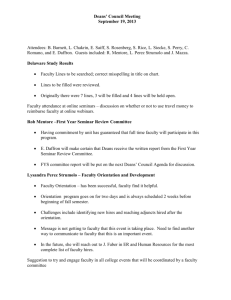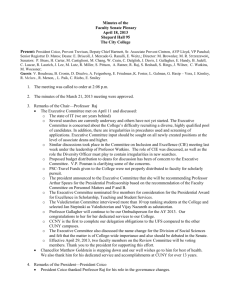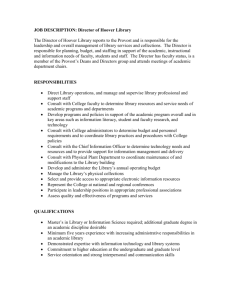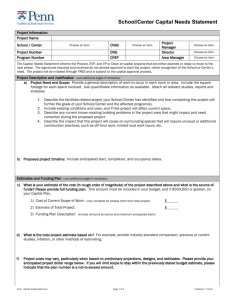Unit Budget Planning and Allocation Process
advertisement
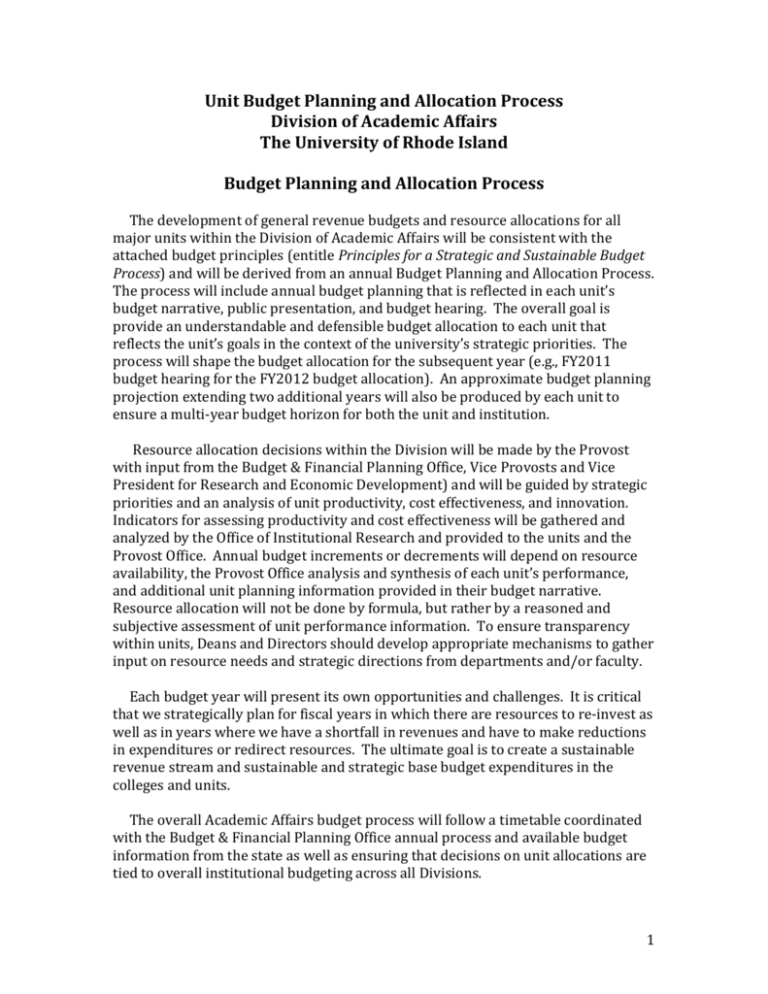
Unit Budget Planning and Allocation Process Division of Academic Affairs The University of Rhode Island Budget Planning and Allocation Process The development of general revenue budgets and resource allocations for all major units within the Division of Academic Affairs will be consistent with the attached budget principles (entitle Principles for a Strategic and Sustainable Budget Process) and will be derived from an annual Budget Planning and Allocation Process. The process will include annual budget planning that is reflected in each unit’s budget narrative, public presentation, and budget hearing. The overall goal is provide an understandable and defensible budget allocation to each unit that reflects the unit’s goals in the context of the university’s strategic priorities. The process will shape the budget allocation for the subsequent year (e.g., FY2011 budget hearing for the FY2012 budget allocation). An approximate budget planning projection extending two additional years will also be produced by each unit to ensure a multi-year budget horizon for both the unit and institution. Resource allocation decisions within the Division will be made by the Provost with input from the Budget & Financial Planning Office, Vice Provosts and Vice President for Research and Economic Development) and will be guided by strategic priorities and an analysis of unit productivity, cost effectiveness, and innovation. Indicators for assessing productivity and cost effectiveness will be gathered and analyzed by the Office of Institutional Research and provided to the units and the Provost Office. Annual budget increments or decrements will depend on resource availability, the Provost Office analysis and synthesis of each unit’s performance, and additional unit planning information provided in their budget narrative. Resource allocation will not be done by formula, but rather by a reasoned and subjective assessment of unit performance information. To ensure transparency within units, Deans and Directors should develop appropriate mechanisms to gather input on resource needs and strategic directions from departments and/or faculty. Each budget year will present its own opportunities and challenges. It is critical that we strategically plan for fiscal years in which there are resources to re-invest as well as in years where we have a shortfall in revenues and have to make reductions in expenditures or redirect resources. The ultimate goal is to create a sustainable revenue stream and sustainable and strategic base budget expenditures in the colleges and units. The overall Academic Affairs budget process will follow a timetable coordinated with the Budget & Financial Planning Office annual process and available budget information from the state as well as ensuring that decisions on unit allocations are tied to overall institutional budgeting across all Divisions. 1 Budget Narrative The budget narrative is first and foremost a planning document for each unit. This document should involve faculty in the strategic planning and budgeting process and the development of innovative approaches to enhancing the quality and integration of teaching and research at the University. The unit budget narratives will be submitted to the Provost no later than March 7, 2011. The budget narrative should not exceed five single spaced pages and should briefly address the following items: Section 1: Mission, Strategic Planning and Investment Requests A brief statement of unit mission. Update the interconnection between unit accomplishments, strategic reallocation of funds, strategic plans and priorities, and the academic Plan and President’s vision. Given a projected budget shortfall for FY12, provide a description and justification of only the top 1 or 2 highest priority new resource needs for the unit for FY12. Indicate whether the request is for base or variable funds. If this request is for personnel, describe the specific duties and responsibilities and how they clearly connect with the academic plan. (Note that funding of these priorities will be limited in the coming fiscal year.) Briefly describe the progress made in your unit over the last 12-15 months in addressing the quality, efficiency and/or effectiveness initiatives critical to the University. Be sure to include activities for enhancing the first year experience (e.g., grand challenges courses), increasing student success and retention, engaging full-time faculty in first-year learning experiences, and efficient and quality delivery of programs of teaching and research. A discussion of “quality” and “diversity” initiatives and accomplishments that augment other performance measures. Section 2: Budget Challenges Given a preliminary analysis of a revenue shortfall in FY12, indicate how your unit would respond to a 2.5% and 5% reduction in expenditures. For the academic colleges, this may involve changes in the delivery of the curriculum, careful examination of assignments and class sizes to maximize efficiency (while not compromising quality or learning outcomes), innovative sharing of resources among colleges, and the reconfiguration of staff support. Section 3: Projected Budgetary Needs for FY13 and FY14 A brief synopsis of anticipatory budgetary needs built upon unit performance and possible new initiatives for FY13 and FY14. 2 Completion of a template Budget Request Spreadsheet that outlines financial requests for FY12 for permanent and one-time only funds including salary and fringe benefit calculations if appropriate. Similarly, anticipatory requests for FY13 and FY14 should also be completed in the appropriate section of the template Budget Request Spreadsheet. (Please note that the template spreadsheet includes a fringe benefit calculator for FY11. Given that we do not have information on future fringe benefit premiums at this time, fringe benefit costs will ultimately have to be adjusted for FY12, FY13 and FY14.) We anticipate requests for major capital investments, such as major renovations or proposed new construction, will be addressed in a separate addendum to the budget narrative in future cycles. Plans and priorities for capital projects are determined by the President with input as needed and/or desired from the Vice President of Administration and other senior administrators. A set of factors to be considered in reviewing and prioritizing potential capital projects will be developed and distributed. Council of Deans Presentation Each unit head (Dean, Vice Provost, Director, etc.) will be expected to make a presentation at the Council of Deans that highlights the unit’s mission, relationship between its plan and overall university priorities, and summarizes unit investment strategies and areas of reduction of necessary. The 15 minute presentation may include a general summary of unit needs and overall directions, but need not include detailed budget or personnel information. The purpose of the presentation at the Council of Deans phase of the process is to insure transparency across units and the university, and to provide an informational basis that might encourage cross-unit collaboration in education, research, outreach, or administrative functions. This year I will invite the Faculty Senate Executive Committee to participate in these presentations. Budget Hearing The budget hearing is a closed meeting involving the Dean (or Unit Director) and one or two others from the unit (usually the Financial Manager) and the Provost, Director of Budget & Financial Planning, Vice Provosts, Vice President for Research and Economic Development, and other senior leaders. These meetings, which will typically last approximately 60-90 minutes, are designed to explore issues related to budget in further detail and for follow up questions. The budget hearing may also provide an opportunity for discussion of unique challenges or opportunities confronting the university and/or the specific unit. 3 FY2012 Budget Process and Allocation Timeline January 25th Provost notifies Deans to prepare budget narrative as specified on page 2 of this document for the following year(s). Budget principles are attached to the memorandum. March 7th Deans return budget narrative to the Office of the Provost. TBD Deans make presentation at the Council of Deans based on submitted budget narrative. TBD Academic Affairs budget hearings commence for each college/unit with Office of the Provost, Office of Budget and Financial Planning, and Research and Development Office. 4
